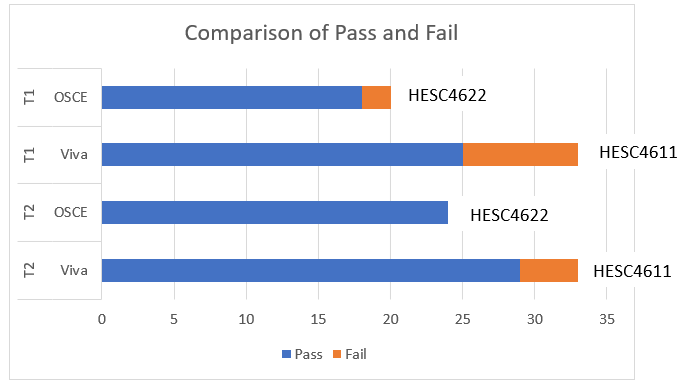Upon commencing convening the Clinical Practicum courses, I recognised that their design had little regard for student diversity in terms of existing knowledge/skills, degree of learning independence and psychosocial situation. Notably, students were left to undertake their clinical training at Work Integrated Learning sites with minimum contact with Academic staff to consolidate their clinical knowledge or receive feedback and support. Moreover, students’ clinical skills were only summatively assessed in the final Objective Structured Clinical Exam (OSCE) which requires them to manage a series of complex clinical cases in a simulated clinic environment. This design and assessment arrangement does not provide opportunities for feedback and dialogue. In response, I attempted to project which students may benefit from additional support during their Practicum. This involved collating data from clinical exams and tutor/lecturer report of student attributes prior to undertaking Clinical Practicum. As a test case in 2017, I highlighted several students who may struggle with learning. Students were then invited to participate in “small-group sessions” which allowed them to practice skills they felt less confident performing with a real patient and with guidance from myself and tutors. These students went on to passing the OSCE with average marks of ~85%.
Evolving from the above, I recognized that several students required more intensive learning sessions to help them manage independent learning. Thus, I developed Practicum Intensive Learning Schedules (PILS). PILS is a schedule of tailored learning activities designed to help students reflect on their clinical skills, set achievable goals to combat issues and be stakeholders in devising strategies to improve their own learning at Work Integrated Learning sites. The program was a successful in its first iteration with multiple students achieving final marks in the 80-85% range and students indicating it was “very helpful”. As such, it is now standard practice for struggling students in the Practicum course and undergoing constant refinement to increase efficiency of individualised program design.
To extend this initiative further, I collaborated with the Pro-Vice Chancellor Education (PVCE) Team to design and initiate regular workshops to help students identify which learning strategies work best for them and refining their clinical skills. I delivered them in a blended learning format and each workshop was videoed and digitally augmented for online delivery for students who are unable to attend. Moreover, I tailored workshop content to adapt to students’ requests, allowing them to be stakeholders in their learning and introduced doodle polling to determine the best times to undertake these Workshops around students’ busy academic and practicum schedules. Our Workshops currently host ~30 self-referred students who engage with the material. Since implementing these workshops and PILS programs, failure rates in the two clinical practicum courses dropped by 67% in one AND the failure rate abolished in the other (no students failed their final OSCE in T2 2019). A comparison can be found in Figure 1 below. As HEC4622 is the final subject in the Exercise Physiology Program at UNSW, the 100% success rate of students ensured timely graduation.





